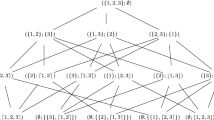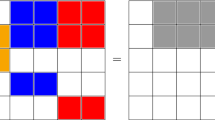Abstract
The purpose of this paper is to provide a necessary and sufficient condition for the non-emptiness of the core for partition function form games. We generalize the Bondareva–Shapley condition to partition function form games and present the condition for the non-emptiness of “the pessimistic core”, and “the optimistic core”. The pessimistic (optimistic) core describes the stability in assuming that players in a deviating coalition anticipate the worst (best) reaction from the other players. In addition, we define two other notions of the core based on exogenous partitions. The balanced collections in partition function form games and some economic applications are also provided.



Similar content being viewed by others
Notes
We can have the same discussion under the assumption that \(v^{{\mathcal {P}}^N}(N)\ge \sum _{S\in {\mathcal {P}}}v^{\mathcal {P}}(S)\) for any \({\mathcal {P}}\in \varPi {\setminus }\{{\mathcal {P}}^N\}\).
Hafalir (2007) defined the convexity in PFF and proved that the convexity implies the efficiency of the grand coalition.
The pessimistic core is closely related to the \(\alpha \)-core of Aumann and Peleg (1960) in which the outside players minimize the gain of coalition S.
The constraints for \(\varvec{\delta }\) are, in the case of three players, as follows:
$$\begin{aligned}&\delta ^{\{1,2,3\}}_1+\delta ^{\{1,23\}}_1+\delta ^{\{2,13\}}_{13}+\delta ^{\{3,12\}}_{12}+ \delta ^{{\mathcal {P}}^N}_{N}=1,\\&\delta ^{\{1,2,3\}}_2+\delta ^{\{1,23\}}_{23}+\delta ^{\{2,13\}}_2+\delta ^{\{3,12\}}_{12}+ \delta ^{{\mathcal {P}}^N}_{N}=1,\\&\delta ^{\{1,2,3\}}_3+\delta ^{\{1,23\}}_{23}+\delta ^{\{2,13\}}_{13}+\delta ^{\{3,12\}}_{3}+ \delta ^{{\mathcal {P}}^N}_{N}=1. \end{aligned}$$If we take, for example, \(\delta ^{\{3,12\}}_{12}=1/2, \delta ^{\{2,13\}}_{13}=1/2, \delta ^{\{1,23\}}_{23}=1/2\), and for any other \((S,{\mathcal {P}})\), \(\delta ^{{\mathcal {P}}}_{S}=0\), then it satisfies the constraints. However, \(\sum _{S\ne N,\ S\ne \{\emptyset \}}\delta ^{\{S,N{\setminus } S\}}_S=1/2+1/2+1/2=3/2\) is less than that of the construction above, which achieves \(\delta ^{\{1,23\}}_1+\delta ^{\{2,13\}}_2+\delta ^{\{3,12\}}_3=1+1+1=3\).
A partition \({\mathcal {P'}}\) is finer than a partition \({\mathcal {P}}\) if for each coalition \(T'\in {\mathcal {P'}}\), there is a coalition \(T\in {\mathcal {P}}\) such that \(T'\subseteq T\).
References
Aumann RJ, Peleg B (1960) Von Neumann-Morgenstern solutions to cooperative games without side payments. Bull Am Math Soc 66:173–179
Bloch F, van den Nouweland A (2014) Expectation formation rules and the core of partition function form games. Games Econ Behav 88:339–353
de Clippel G, Serrano R (2008) Marginal contributions and externalities in the value. Econometrica 76:1413–1436
Funaki Y, Yamato T (1999) The core of an economy with a common pool resource: a partition function form approach. Int J Game Theory 28:157–171
Gillies DB (1959) Solutions to general non-zero-sum games. Contrib Theory Games 4:47–85
Hafalir I (2007) Efficiency in coalition games with externalities. Games Econ Behav 61:242–258
Hart S, Kurz M (1983) Endogeneous formation of coalitions. Econometrica 51:1047–1064
Hart S (1984) Stable coalition structures. In: Holler MJ (ed) Coalitions and Collective Actions. Physica-Verlag, Wuerzburg, pp 235–258
Kóczy LÁ (2007) A recursive core for partition function form games. Theory Decis 63:41–51
Peleg B, Sudhölter P (2007) Introduction to the theory of cooperative games, Chapter 3, 2nd edn. Springer, Berlin
Ray D (1989) Credible coalitions and the core. Int J Game Theory 18:185–187
Ray D, Vohra R (1999) A theory of endogenous coalition structures. Games Econ Behav 26:286–336
Thrall RM (1961) Generalized characteristic functions for n-person games. In: Proceedings of the Princeton University Conference of Oct, 1961
Thrall RM, Lucas WF (1963) n-Person games in partition function form. Nav Res Logist Q 10:281–298
Author information
Authors and Affiliations
Corresponding author
Additional information
The authors thank an anonymous referee and an associate editor for their helpful suggestions and comments.
Rights and permissions
About this article
Cite this article
Abe, T., Funaki, Y. The non-emptiness of the core of a partition function form game. Int J Game Theory 46, 715–736 (2017). https://doi.org/10.1007/s00182-016-0554-6
Accepted:
Published:
Issue Date:
DOI: https://doi.org/10.1007/s00182-016-0554-6




